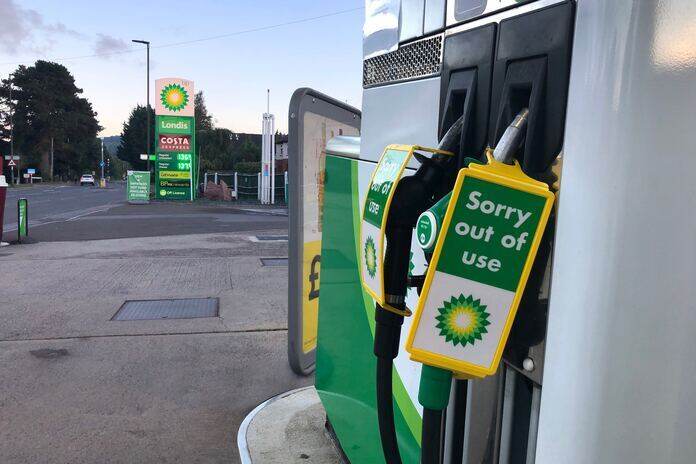BP Plc (NYSE:BP)
BP (NYSE:BP), one of the largest oil and gas companies in the world, just recently published its earnings report for the first quarter of 2023. According to the report, BP’s net income for the first quarter of 2023 was $3.3 billion, representing a 25% increase when compared to the same period in the previous year’s financial results. The primary factors that contributed to this growth were increases in oil production as well as prices.
The British oil major BP surpassed analysts’ expectations in the first quarter due to strong results from trading oil and gas. The company also announced that it will buy back an additional $1.75 billion in shares.
The underlying replacement-cost profit that BP reported for the first quarter was $4.96 billion, which is a metric that is comparable to the net income that is reported by U.S. oil companies. This figure was higher than the average forecast of $4.27 billion that was given by 25 analysts in a survey that was compiled by the company. It was lower than the previous year’s total of $6.25 billion.
The outcome came after BP posted a full-year profit in 2022 that broke all previous records and after the company decided in February to scale back earlier targets for reducing the amount of oil and gas it produces.
That profit of $27.7 billion in 2022—according to the same underlying replacement-cost measure—and BP’s plans to increase spending on oil-and-gas production had made the company a target of some shareholders, including U.K. pension funds, who were angry about its slower-than-planned shift away from fossil fuels. These shareholders wanted the company to accelerate its transition away from fossil fuels.
Despite an investor challenge centered on his role and BP’s clean-energy strategy, Chairman Helge Lund won just over 90% support at BP’s annual meeting last week. Those shareholders were unable to mount much of an attack at the meeting, which took place last week.
At the meeting that took place a week ago, approximately 17% of shareholders who cast votes in favor of resolutions supported one that urged BP to strengthen its low-carbon energy strategy. This is in comparison to the 15% of shareholders who supported a climate resolution from the shareholder group Follow This the year before, which was a decrease from the roughly 21% of shareholders who supported the proposal the year before that.
Following Russia’s invasion of Ukraine, major oil companies are continuing to post strong profits, which is fueling criticism from politicians and others who say that consumers are being forced to shoulder high energy costs while large companies shower investors and their own executives with cash.
Even though they have come down from record highs, the price of natural gas is still quite volatile, particularly in Europe. Similarly, the price of oil has also come down. BP announced on Tuesday that it paid approximately $650 million in taxes in the first quarter stemming from its oil-and-gas operations in the United Kingdom’s North Sea. Of that amount, $300 million was related to a new energy-profit levy that the United Kingdom adopted last year to help offset high energy prices. This type of tax is commonly referred to as a windfall tax.
BP reported that it was able to increase its profit for the first three months of this year thanks to “exceptional results” in gas marketing and trading, “strong results” in oil trading, and a lower level of refinery maintenance activity. These were partially counterbalanced by narrower margins on refined fuel products.
In comparison to the net income of $10.8 billion that was reported for the previous quarter, the company reported a net income of $8.22 billion.
Additionally, the company announced that it intends to initiate a share repurchase program valued at 1.75 billion dollars.
According to BP, the board of directors has not changed its mind about allocating sixty percent of the company’s surplus cash flow to buy back shares in 2023. According to the most recent projections of oil prices, the company anticipates that it will be able to complete buybacks totaling approximately $4 billion each year.
According to RBC Capital Markets analyst Biraj Borkhataria, who stated in a research note published on Tuesday morning that BP’s forecast for higher maintenance costs from oil-and-gas production and lower refining margins could weaken its cash flow, that buyback rate could disappoint some investors.
In the early morning trading, BP share prices dropped by almost 5%. Oswald Clint, an analyst at Bernstein, stated in a note that the announced buyback was less than what was anticipated, “which will cause some concern and pressure the shares today.”
BP’s new share buybacks totaled $1.75 billion, which was approximately one billion dollars less than the amount the company repurchased in the prior quarter. During a conference call that took place after the earnings report was published, analysts grilled BP’s Chief Financial Officer Murray Auchincloss with questions about buybacks. They claimed that investors had been anticipating more information.
Mr. Auchincloss defended the level of share purchases by stating that the company was exceeding the minimum amount it had targeted in its guidance. According to him, BP increased the amount during this quarter to exercise the flexibility it has to deal with swings in the capital used to run its day-to-day operations while still remaining within its financial plans. He said this was done in order to keep BP within its financial plans.
BP announced on Tuesday that low-carbon energy projects in Europe and Asia, such as solar, offshore wind, and clean hydrogen production, are advancing with new regulatory approvals and development plans. These projects include solar energy, offshore wind energy, and clean hydrogen production.
Although labor costs continue to eat into margins at BP convenience stores, Mr. Auchincloss reported that the company’s business in biofuels is growing, as is its reach in electric-vehicle charging.
In summary, BP’s earnings report for the first quarter of 2023 revealed remarkable growth, which was driven by higher oil prices and increased production. The ongoing strategy of the company to streamline its operations and concentrate on its core assets has also contributed to an increase in profits. BP has a positive outlook on the future and is committed to becoming a net-zero company, both of which position it as a powerful player in the energy sector.
Featured Image: Unsplash @ designfactory









